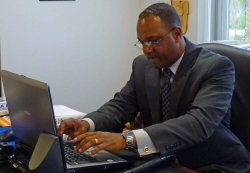CEO OF SAN DIEGO'S NEIGHBORHOOD HOUSE, NAMED TO LEAD UNITED NEIGHBORHOOD CENTERS OF AMERICA
 March 3, 2010 (San Diego) - As a small child, Rudolph Johnson learned school skills through the Head Start program. Today he runs it -- along with Neighborhood House, Head Start's parent organization. Later this month, Johnson will assume command of United Neighborhood Centers of America, taking a national leadership role in striving to help children in neighborhoods nationwide.
March 3, 2010 (San Diego) - As a small child, Rudolph Johnson learned school skills through the Head Start program. Today he runs it -- along with Neighborhood House, Head Start's parent organization. Later this month, Johnson will assume command of United Neighborhood Centers of America, taking a national leadership role in striving to help children in neighborhoods nationwide.
“I’m trying to model behavior for the children of San Diego—the next generation of leaders,” says Rudolph Johnson III, president and CEO of Neighborhood House Association in San Diego. “There were no role models when I was growing up. We are trailblazing.”
Johnson, 44, was born in 1965, the year the Civil Rights Act was passed. “My parents were actively involved in the Civil Rights movement,” he recalled. “Tensions were very, very high.”
He grew up in a “tough neighborhood” in East San Diego near 31st and Ocean View. The community was gang-infested, with no parks or recreational facilities. The oldest of three children, he recalls, “Back in my day, Boys’ Club was where you went. We had to be innovative. We would turn someone’s lawn into a football field. A vacant lot was our baseball diamond…My ability to be innovative comes from that background.”
 His parents didn’t have much money, but couldn’t qualify for traditional childcare benefits. When he was three years old, they went back to school and Johnson was enrolled in Head Start, a program founded in 1965 to help lower income children develop school readiness skills. Johnson estimates the federal government spent about $2,000 in him through Head Start—and he believes it was a good investment for taxpayers. “I think I’ll pay 100 times that in taxes,” he estimates, “and I’m a productive member of society. “
His parents didn’t have much money, but couldn’t qualify for traditional childcare benefits. When he was three years old, they went back to school and Johnson was enrolled in Head Start, a program founded in 1965 to help lower income children develop school readiness skills. Johnson estimates the federal government spent about $2,000 in him through Head Start—and he believes it was a good investment for taxpayers. “I think I’ll pay 100 times that in taxes,” he estimates, “and I’m a productive member of society. “
 Today, Johnson is the driving force behind Neighborhood House in San Degio County, which provides eleven programs in and ten social services—including the Head Start program, which today provides child development, health and nutrition for youngsters from birth to age five, as well as prenatal services. In San Diego, Neighborhood House serves over 8,000 families daily. It is the third largest nonprofit in San Diego County and the fifth largest Head Start grantee in America.
Today, Johnson is the driving force behind Neighborhood House in San Degio County, which provides eleven programs in and ten social services—including the Head Start program, which today provides child development, health and nutrition for youngsters from birth to age five, as well as prenatal services. In San Diego, Neighborhood House serves over 8,000 families daily. It is the third largest nonprofit in San Diego County and the fifth largest Head Start grantee in America.
“Our mantra is `There are a thousand Rudolph Johnsons in the country,’” he said.
Johnson counts himself fortunate that his parents emphasized scholastic achievement. He went to public schools and developed skills in math and science. After graduating from high school, he got a full athletic scholarship to attend Texas Southern University, a historically black college. “One of my coaches in the first quarter asked, `What are you going to major in?’” he recalled. “I said `civil engineering’ because I had a skill set…I was one of only five football players to graduate with a civil engineering degree.”
He later also got a masters degree in public administration from San Diego State University. Back home in San Diego, he became a civil engineer for the City of San Diego, also serving as president of the City’s Black Employees Association. The City Manager appointedt him as a City Council Liaison, one of the few African-Americans to hold such a position. He was later assigned to work on the Convention Center expansion project and eventually went to work for the Convention Center and became general manager.
When the lead position at Neighborhood House became available, Johnson competed in a national search to win the position.
 His goal is lofty. “Eventually, we want to be the social service model for the entire country,” he told East County Magazine.
His goal is lofty. “Eventually, we want to be the social service model for the entire country,” he told East County Magazine.
In addition to Head Start, Neighborhood House offers mental health serices, senior nutrition, adult day healthcare, emergency food, teen pregnancy prevention, HIV/AIDS case management, HIV/AIDS transportation, Innovisions (a fee for service program), and one of the few certified Housing & Urban Development (HUD) counseling programs in California. Services are dispensed through 120 locations countywide.
Since bringing his team through the doors several years ago, Johnson has worked to change the culture of the agency by improving communications to foster open dialogue and make all team members feel important. He’s also worked to create a brand association. “Whenever you see our brand, you’re going to associate excellence with that brand,” he said. His group has engineered and rebuilt infrastructure. “We’re more nimble and better,” he said, citing automating key systems as an example.
The organization receives 90% of its budget from the federal government. “We are fortunate. Part of the stimulus included expansion of Head Start and a COLA (cost of living adjustment) increase,” he noted. Neighborhood House gets remaining funds from the state and county, also raising about half a million dollars in private donations last year.
Neighborhood House has felt the pain of state budget cuts, however, losing 5-10% a year over the past couple of years. “This year’s state budget looks just as bad,” Johnson said, adding that he expects to see more cuts and aspires to raise more money. He notes that during today’s recessionary times when many are out of work and have lost homes, the need is greater than ever. “Every year, we will make business decisions on how many we will be able to service in state programs,” he said.
The organization is also making an impact globally. Four international delegations have visited San Diego’s Neighbhorhood House to study the operation as a model to be replicated abroad. Those delegations were from Iraq, South Africa, Brazil and Europe.
“Iraq is now in the process of building their social service infrastructure,” Johnson said, adding that the visitation was arranged through the U.S. State Department. “We are having a direct impact on how Iraq is being formed.”
Married with two children, Johnson enjoys helping others through his work. “The beauty of being a CEO is that no two days are alike,” he said, adding that he’s become a generalist with knowledge in areas ranging from finance and risk management to law, politics, and entrepreneurial skills. “Today, some Chargers players are coming in,” he said, referring to a career internship program for “life after football.” Other days, he’s off to events co-sponsored by Neighborhood House, from YMCA functions to a Cesar Chavez event to a Chamber of Commerce dinner.
 On March 23-26, he will be hosting colleagues in San Diego and will assume the gavel as the new president of United Neighborhood Centers of America--an organization that traces its roots to Jane Addams and the settlement movement in 1911. He looks forward to taking leadership responsibilities at a national level.
On March 23-26, he will be hosting colleagues in San Diego and will assume the gavel as the new president of United Neighborhood Centers of America--an organization that traces its roots to Jane Addams and the settlement movement in 1911. He looks forward to taking leadership responsibilities at a national level.
He also serves on the boards of United Neighborhood Centers of America, Families International Inc., and San Diego Planned Parenthood.
Locally, Neighborhood House Association employs 800 individuals with a payroll of $2.1 million every two weeks. “We think we are a strong economic engine in the local economy,” Johnson said. “We also put $30 million into the local economy in goods and services, from paper to van rentals. “
As for Johnson’s goal of making San Diego a national model, he concludes, “We’re closer than ever.”
Interviewed during February, Black History Month, Johnson also reflected on how race relations in our community have evolved since his childhood days at a Head Start program in Logan Heights.
“When you grow up in that environment, you know that you’re at the lower end of the economic scale—and you know the reason for it,” he observed. “When we think we have made a bunch of progress, I would beg to differ. People of color, not just African-Americans, are still on the lower end of the scale. I don’t think that we’ve achieved equality.”
Just as President Barack Obama now serves as a role model to inspire young people of color across American and indeed, around the world, Johnson aspires to lead by example. I’m hoping to build a bridge,” he said of today’s younger generation, “so they won’t have to trail blaze.”
For more information, visit














Recent comments